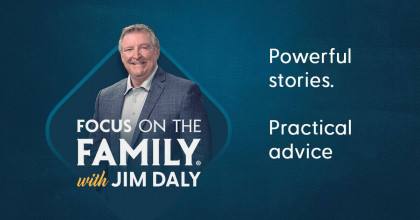Brant Hansen: In that moment when you’re, when you’re anxious about something, go back to some moment you had in life that you’re really thankful happened and just camp out there. It could be some time you were just laughing really hard with friends or when you had your baby or the first time you met that friend, and just camp out there. You can feel your blood pressure dropping. I’m telling you, this is not pie in the sky stuff.
John Fuller: That’s Brant Hansen, and he’s our guest today on Focus on the Family with Jim Daly. Thanks for joining us. I’m John Fuller.
Jim Daly: John, it’s very easy, uh, even as Christians to develop a negative attitude about the world around us. I mean just flick-
John: Yeah.
Jim: … on cable news and you’re gonna get, you know-
John: All doom and gloom, yeah.
Jim: … a little bit discouraged. Uh, people are concerned about so many things, the evils of government, injustice, poverty, wars, infanticide. And it just keeps coming at us pretty much 24/7. Uh, Brant Hansen has a great way of breaking through that clutter and pointing us back to the truth that the gospel and the joy we get from the gospel is what we should have in Jesus.
John: Mm-hmm.
Jim: And people should be able to look at, at us and see a difference, right?
John: Mm-hmm. Yeah.
Jim: And I am thrilled to talk with Brant today about how we get there, because we should be different.
John: Yeah. Brant is a best-selling author. He’s a radio host. Uh, one of the books he’s written is called Life is Hard. God is Good. Let’s Dance.
Jim: (laughs)
John: … uh, Experiencing Real Joy in a World Gone Mad. Get a copy of it from us here at the ministry. Our number is 800, the letter A and the word FAMILY, or stop by focusonthefamily.com/broadcast to get your copy.
Jim: Brant, welcome back to Focus.
Brant: Thank you. Honored to be here again.
Jim: It’s (laughs) always good to talk with you.
Brant: Thanks.
Jim: You got great stories. I love the way you write. Um, it just connects with, with me and so many others, obviously. You’re a successful author. And, uh, it’s good to have you.
Brant: Thank you. Um, I, I think for me, it’s like, trying to write to friends.
Jim: Oh, that’s good. That’s a-
Brant: I think of a friend and-
Jim: That’s the framework in which-
Brant: Yeah.
Jim: … you tend to do it?
Brant: Yeah, rather th-
Jim: Well-
Brant: … rather than like, I’ve got this important thing to say. Like, no, this is what God’s showing me and let’s talk about it.
Jim: And what’s interesting, an- and you’ve talked about this publicly so I’m not saying something that you haven’t shared, but you’re on the spectrum.
Brant: Yeah.
Jim: Um, and so it may not come as easily for you as how people might think of it. Oh, he’s a great writer because he knows how to communicate. But socially, there’s some things-
Brant: Totally.
Jim: … that you’ve had to learn how to overcome.
Brant: Uh-huh.
Jim: Just describe that for the listeners to kinda set the tone for today.
Brant: Yeah. I have, um, high functioning on the spectrum, on the autism spectrum, and it’s something that, uh, makes socializing more difficult. Picking up on people’s cues-
Jim: Right.
Brant: … uh, it’s very difficult. I’ve learned over time. Like, I’m making eye contact with you now. I wouldn’t normally. I do it because humans are supposed to do that.
Jim: (laughs) Yeah.
Brant: So, uh, uh, you learn this stuff, but actually, I think it’s a real asset and, uh, because it gives you a perspective. Other people are like, “Wow, I’ve never thought about it that way before.”
Jim: It’s interesting. I mean, it’s areas of the brain that are unlocked.
Brant: Yeah.
Jim: Like, you know, if you don’t deal with this, you don’t experience life quite the same way.
Brant: Yeah.
Jim: And I have people close to me that have this as well, and when we talk about it, it’s, it’s really eye-opening for me about how they interpret other people’s emotions and read faces or don’t read faces.
Brant: Yeah.
Jim: So it kinda, yeah, it kind of, it’s a different lens in which you view the world and-
Brant: Yeah, and I think that’s helpful.
Jim: Yeah, totally.
Brant: I think God’s actually used it, and it helps, like, comedians that are on the spectrum too. Like, you’re, you’re, you’re always observing and you see absurdity-
Jim: Right.
Brant: … where other people don’t.
Jim: Yeah.
Brant: And that’s actually a real tool.
Jim: There’s a depth to it, and that’s what I’ve come to appreciate-
Brant: Mm-hmm.
Jim: … about being on the spectrum and with autism. Uh, let me ask you about this though. When you were a child, uh, and this is funny because of, it’s a typical type of story. All the mayhem that you were trying to process as a child, you decided to start drawing maps in your bedroom about, uh, surviving a nuclear war. I mean, this is exactly-
Brant: Yeah.
Jim: … you just go down in deep.
Brant: All the way, right.
Jim: So, what was that about?
Brant: Well, it was just, uh, we had a lot of trauma in our family. And, uh, but I just took things very seriously, just existentially serious, like everything could end. I was afraid that Jesus was gonna come back any instant and find me wanting. I’d watch those freaky movies about that at church. Uh, was, is that time you were really worried about nuclear war. But I would draw maps of fallout, like, how would it affect stuff. You know, my mom’s like, “You should lighten up just a little bit.”
Jim: (laughs)
John: Yeah, right.
Jim: Must’ve freaked your mom out a little bit. And quicksand was another thing. Did that-
Brant: Oh, totally.
Jim: Yeah.
Brant: Well, quicksand- Anybody who’s, like, my age, like, you grew up with television, like, every show at one point in the ’70s and ’80s was all somebody who’s in quicksand.
Jim: Gilligan’s Island-
John: Oh, that’s true, isn’t it?
Jim: … every other episode.
Brant: Dukes of Hazzard.
Jim: (laughs) Dukes of Hazzard.
Brant: All of it, everybody’s in quicksand. I, you grow up thinking, “This is gonna be a real problem. I’ve got to avoid quicksand.”
Jim: Then you go looking for it, you can’t find it (laughs).
Brant: It’s not really that big of an issue, is it, guys? Like, it’s really, no one dies from quicksand.
Jim: I’m not sure what the CDC numbers are, but I’m sure it’s-
Brant: No, it’s zero.
Jim: … not anything too high.
Brant: I looked it up.
Jim: It’s zero. (laughs)
John: (laughs)
Brant: It’s such a relief. But like, it’s just funny how we have these things that blow up in our heads that we actually didn’t need to be worried about.
John: Mm-hmm.
Jim: Yeah, you’re more likely to die from lightning strike than-
Brant: Sure.
Jim: … quicksand. Yeah.
Brant: Right. But we’re worried.
Jim: You know, Brant, eh, we’re lighthearted about this, but there, we are bombarded, uh, with problems.
Brant: Yeah.
Jim: I mean, we get it, uh, just going to the school board meeting or we get it from watching the news. Or we get it from entering into any kind of political discussion today because it’s so volatile. Um, but you as a child, things were not easy for you. You had some things going on with your mom and dad’s marriage-
Brant: Mm-hmm.
Jim: … not doing well. Just explain that environment a little more in depth.
Brant: Well, I’m from a preacher’s family, and, but there was a lot of trauma in the house and f- a lot of fear. I was terrified a lot of the time, honestly, and so was my brother. And, uh, they got divorced eventually and then remarried and then divorced again. My mom just wanted to make it work-
Jim: Mm-hmm.
Brant: … but it was pretty bad. Um, and I use that as a backdrop and I mention it in the book just a little bit just because I want people to know I’m not happy-slappy, like, “Hey, put on a happy face.” That’s not this book. It’s not just glossing over all these problems like you’re talking about. It’s not about being naïve to the world, but we can actually be at peace.
Jim: Yeah.
Brant: It’s a real thing. Jesus is not crazy when he says like, “You can be like the birds of the air, the, and the lilies of the field.” This is not happy talk. There is a way to become a less anxious person where you’re actually at peace. And if it could, it could happen to me, then I think it could be accessible to anybody.
John: Mm-hmm.
Jim: You know, Brant, again, one of those processing benefits I think you possess as someone on the spectrum, when you went through that with your folks and your dad being a pastor, and I don’t have all the nuances. I’ve read your background, so that’s what I see.
Brant: Yeah.
Jim: Um, many people will use that as the excuse-
Brant: Yeah.
Jim: … to not continue to follow God.
Brant: Right.
Jim: You know, “I’m not a Christian because my dad was a pastor and he was a horrible person.”
Brant: Yep.
Jim: And he was abusive or whatever the, the characterization is of that. Um, I run into people like that.
Brant: Yeah.
Jim: But something in you was different-
Brant: Yeah.
Jim: … so you started saying to yourself, what? And it kept you in the faith.
Brant: Yes. So, I’m a hyper-skeptic. I’m extremely skeptical. What I feel like is a lot of people are only skeptical about Jesus.
Jim: Hmm.
Brant: Like, but they’ll buy into the culture without asking the same difficult questions. Like, does this actually work? Is our culture, like, thriving?
Jim: Yeah.
Brant: Like, but it actually chased me back around to Jesus ’cause He’s the only one, He’s like a respite. You read His words, you read the gospels, He’s sometimes the only one that makes any sense to me.
Jim: Hmm. Yeah (laughs).
Brant: Honestly, like, He’s a, He’s a relief. So for me, He’s the only one that calls out human brokenness and then does something about it-
Jim: Yeah.
Brant: … instead of pretending like, no, there’s no such thing as sin, or we don’t have no way out. Like, who else speaks about self-righteousness like He does? Who else lifts up the, the poor? Who else flips things upside down? And His, His Kingdom is so beautiful. I don’t wanna leave that. So here’s the thing about hypocrisy. Yes, there are hypocrites. We know ’em, tons of them, like, big-time hypocrites, got it. I’m not gonna give that person the power to rob me of the best relationship of my life. Why wou-
Jim: That’s very logical.
Brant: Right.
Jim: (laughs)
Brant: Why would I do that? It’s very logical.
Jim: Yeah.
Brant: Like, yes, that’s a problem. Yes, what I went through is horrible. That all happened, but God is good.
Jim: Yeah.
Brant: Doesn’t change that reality.
John: Mm-hmm.
Jim: You know, the one thing that I’ve responded to, I mean there are what I would call hyper-hypocrites that you’re describing.
Brant: Sure.
Jim: But in reality is human beings and being sinners, even as Christians, we’re all hypocrites-
John: Mm-hmm.
Jim: … ’cause we can’t live it perfectly. And-
Brant: We don’t even live up to our own standards.
Jim: But it-
Brant: No one does.
Jim: … it is really good to challenge somebody who uses that as an excuse not to, not to go after a relationship with Christ. “Well, I would, but I knew, I know too many of his followers-
Brant: Used to-
Jim: … and they’re not very good people.” Man, that is, like, stupid.
Brant: He’s gonna… Like, why would I give this up?
Jim: Yeah (laughs).
Brant: He’s the only actual source of peace.
Jim: Yeah.
Brant: Nothing else is gonna last. Like, why would I… I’m just thinking about it logically.
Jim: Yeah.
Brant: Why would I give that up because of what my dad did?
Jim: Yeah. Oh-
Brant: I’m not gonna. Or whatever I’ve done or whatever other people.
Jim: Mm-hmm.
Brant: Here’s the other thing about the people and I’m, I’m being skeptical of people and myself. Well, when people write their manifestos, when they deconstruct and they say, “I’m leaving the faith,” and they talk about the hypocrisy. They’ll talk about politics, they’ll talk… I’ve noticed something. This is, this is several high-profile ex-pastors or artists or whatever. They don’t mention Jesus. I don’t understand that.
Jim: Hmm. What do they typically say?
Brant: They talk about politics and hypocrites and the church this and that, like, what they… Like, but I wanna know is somebody who’s a Jesus follower, like, yeah, but who, wha- wha- who do you think Jesus is now?
Jim: Yeah.
Brant: Why does-
Jim: If you stop.
Brant: I, if… What were you in this for?
Jim: Right.
Brant: And if it wasn’t for Him and His Kingdom, I would leave too.
John: Mm-hmm.
Jim: We-
Brant: It’s too goofy (laughs).
Jim: Yeah. Your title kinda has something that’s a bit challenging for Western culture, which is lemme say for lack of a better word, living the high life. I mean, we have everything we need-
Brant: Mm-hmm.
Jim: … um, for the most part.
Brant: Mm-hmm.
Jim: We have access to it.
Brant: Self-sufficient.
Jim: You work hard, you’re gonna have a nice house. You’ll have food, you’ll have… you know, all those things. But your title, Life is Hard. God is Good. Let’s Dance. The life is hard part is where we break down. Uh, being a Christian doesn’t mean life will be easy.
Brant: Right.
Jim: It’s just, i- what the Lord is saying is that you will, I will equip you to manage these difficulties with peace and joy.
Brant: Yeah. So peace, I love Dallas Willard’s definition. Actually, his definition of joy is a pervasive sense of wellbeing regardless of circumstances.
Jim: Right.
John: Mm-hmm.
Brant: So, regardless of circumstances, that means… So we can get worried and we can think it’s unrealistic not to worry, but what he’s actually saying is, he said it, “In this world, you will have troubles, but be of good cheer. I’ve overcome the world.” Like, wink-wink, nod-nod-
Jim: Yeah (laughs), right.
Brant: … I know how this ends.
Jim: Right.
Brant: And I know even people who are grieving, I’ve known people who’ve gone through the worst-case scenario, we can all rehearse these in our minds all the time. But I know people who’ve gone through it who say, “This peace showed up that I’ve never experienced before-
Jim: Mm.
Brant: … and it showed up only when I was going through that.” And, uh, there’s this sense of wellbeing you can have even if you’re grieving-
Jim: Yeah.
Brant: … even if you’re, even if there’s chaos going on around us, there’s reasons to be upset, you can still be at peace. And we’re missing out on that.
Jim: I think, and the evidence of the Holy Spirit, I mean, when you can be in very difficult circumstances and your faith is intact and you’re waking up with a sense of joy. You know, you might have distractions and all that, but I feel like that is when the Lord’s smile is the biggest ’cause He has your heart. If you, regardless of your circumstances, have your trust, your peace, your hope in Him, He’s got you.
Brant: Yeah.
Jim: And that is intimidating for the enemy of our soul.
Brant: Yeah. I think so. I love that Jesus takes His friends out on a lake.
Jim: (laughs)
Brant: And He did. That was His idea to go in those boats on a lake.
Jim: Yeah.
Brant: Let’s cross the lake. He knows a storm’s coming.
Jim: Yeah.
Brant: It even mentions in the story in Mark, like, it says that He brought a cushion, which is the stra- or He, He was sleeping on a cushion. Like, there’s no other mention of cushion in the entire Bible.
Jim: Yeah.
Brant: I thought that was funny, but it’s like, why this detail? He’s relaxed.
Jim: He’s chillin’.
Brant: He’s chillin’.
Jim: (laughs)
Brant: He’s relaxed, and that’s His whole approach is He’s relaxed. He knows all the chaos in the world.
Jim: Yeah.
Brant: It’s not naivete, but they freaked out. And His reaction was, “Where did you put your faith? What happened?” But it’s like, here was this test. You guys failed. Don’t you know that even if the boats go down, you’re still okay?
Jim: That’s the point.
Brant: Right.
Jim: This is called eternity.
Brant: Right. So-
Jim: And you know, I might’ve done the same thing in that setting.
Brant: Me too.
Jim: “Hey, wait a minute, Lord. Man, the wind’s blowing.” Lemme ask you, you pointed to Paul in scripture as a good example of an optimist. Sometimes I don’t see Paul in quite that light, you know? But how did, why did that stick out for you, Paul?
Brant: Okay. So there’s a story with Paul, and I don’t know, I’m not talking about just a lighthearted optimism that you just go through life, nothing ever ha- you know, Pollyanna stuff.
Jim: (laughs) Pollyanna-
Brant: Yeah, not that.
Jim: … isn’t that funny?
Brant: So, yeah, that, that is kinda funny. I should’ve thought of that.
Jim: (laughs)
Brant: Uh, but there’s actually a story in Acts, and I didn’t even notice it til I was writing this book. At the end of Acts, it’s, they’re on a boat, and it mentions there’s 275 people on the boat. Like, there’s an exact number.
Jim: Yeah.
Brant: 274 people on the boat are freaking out because it’s going to go down. It’s going to wreck. They know it. The, these, you know, the captain knows it. Everybody on board, the salty sea hands or whatever, they know it. Except for Paul, who’s been told by God that everybody’s gonna be okay.
Jim: Yeah.
Brant: And so they’re all freaking out and he’s not. Now, from their perspective, he’s nuts.
Jim: Mm-hmm.
Brant: He’s naïve, don’t you understand? You’re ignorant of what’s going on out here. Don’t you… But he’s not naïve. He doesn’t know less than they do, he knows more. That’s the source of his peace.
Jim: Wow.
John: Mm.
Jim: Well, in fact, you say that j- joy is an informed decision.
Brant: Yeah.
Jim: That’s an example of that.
Brant: Yes, it is. Like, it’s not knowing less. So if people are like, “Don’t you see what’s on the news? Didn’t you see this thing? What are… You see what’s happening in schools?” Yes, there’s so many things-
Jim: Mm-hmm.
Brant: … that we can be worried about. And yet, Jesus is not naïve about these things. There’s crazy stuff at the time that He’s dealing with with the audience that’s listening to when He’s talking, maybe even crazier.
Jim: Hmm.
Brant: Maybe.
Jim: Mm-hmm.
Brant: But it doesn’t make these things go away. It’s not saying these things aren’t important. These things are important. We have to protect the vulnerable. We’ve gotta do the right thing, but the wh- the whole point, as He’s saying, “With me, do you realize you’re safe? You’re actually safe. You don’t need to worry about tomorrow.”
Jim: Mm. Yeah.
Brant: That gives you a sense of wellbeing reg- But you have to remind yourself of this stuff, but that’s the strong hand that we’re actually playing with. And we shouldn’t be as-
Jim: Right.
Brant: … worried as everybody else.
Jim: And what it is is a competition between your soul and your flesh.
Brant: That’s right.
Jim: And that’s what that competition is. Your flesh is gonna lean into anxiety, fear. Your soul’s gonna say, “Trust.”
John: Yeah. Well, we hope you’re encouraged by what you’re hearing today from Brant Hansen on Focus on the Family with Jim Daly. Uh, we’re talking about his book, Life is Hard. God is Good. Let’s Dance: Experiencing Real Joy in a World Gone Mad. And you can get a copy from us here. Uh, give us a call, 800-A-FAMILY, or stop by focusonthefamily.com/broadcast.
Jim: Brant, you work quite a bit with CURE.
Brant: Mm-hmm.
Jim: And that’s a medical mission, and, uh, they… You can describe it better than I can. I’m looking forward to hopefully taking Trent on a trip there-
Brant: Yeah.
Jim: … ’cause he’s interested in-
Brant: Yeah.
Jim: … medical stuff. But, uh, in that regard, when we look at reasons people don’t believe, you’ve kinda seen the counterbalance to that.
Brant: Yeah.
Jim: I think one example you had, uh, was a girl’s story with a cleft palate on one of these trips. What happened and how did that end up being a positive thing?
Brant: Well, this is a big deal for me because of my background and because I don’t… I wanna see Jesus for real, so I’m skeptical of words, even my own. I just feel like anybody can look good on stage.
Jim: Yes.
Brant: Anybody can do that. I’m not impressed. So I want to see Jesus really at work, and that’s what drew me to these hospitals. So these are full-on permanent surgical hospitals. There’s nothing else like this in the world.
Jim: Africa, Philippines.
Brant: Africa, Philippines, there’s eight full-on hospitals, hundreds of employees, nurses, surgeons, orthopedic, neuro, plastics. It’s all done in the name of Jesus. So they are loved. These are people that are, these are… It’s, they’re pediatric hospitals. It’s kids and their parents who have been rejected because they have some kind of a disability and they think they’re cursed. And the first time I visited, I was hooked ’cause there was a 17-year-old girl, and I, I write about this in the book, who had never really been out of the house-
Jim: Mm.
Brant: … because she had severe bilateral, like, a cleft palate. So there’s this hole underneath her, her nose. But she’s 17, so she’s a full-grown woman, basically. And she was obviously very quiet, very traumatized, but they didn’t want her out of the house because ju- they would be kicked out of the community if they saw that they had a daughter who was cursed.
Jim: Right. That’s how they translate that.
Brant: Yeah, right.
Jim: Mm-hmm.
Brant: Which is how a lot of traditional cultures view it. Even they bla- brought a blind man to Jesus, said, “Who sinned?”
Jim: Right.
Brant: Right.
Jim: Same ol’.
Brant: He said, “S- This happened so God could be glorified.” So I get to see that at these hospitals. With this girl after her surgery, the swelling was going down a little bit, but already that hole was gone and her, her lip was whole. And I couldn’t believe the difference. And she was sitting there with her mom, and I sat down with them. And I didn’t have a mirror, and, uh, I was like, “Wait, I have my phone.” So I took my iPhone and I flipped the camera around and handed it to her. And I mean, she just held that thing and was just in-
Jim: Yeah.
Brant: … shock, awe. She was beautiful. Like, that looks like Jesus to me. And then they’re told, “This is why we’re doing this.” They’re, they’re told the gospel about the Kingdom of God, and it’s so beautiful. And last year, I say all this f- for a point. People don’t have to give to CURE or whatever, it’s fine, but it’s like, they did 18,000 surgeries last year all in the name of Jesus.
John: Mm.
Brant: And people become believers. They’re singing… They’re thanking God, tears of joy in the… Like, there’s worship throughout. They’re praying over the kids in the OR. But to me, I’m like, I needed to see that.
Jim: Mm-hmm.
Brant: And this is another reason, like, I’m not leaving this if somebody’s like, “Well, I don’t like the politics. I don’t like this or that about the church. Or these are hypocrites.” I’m like, “Okay, man, but I’m not leaving this.”
Jim: Yeah.
Brant: This is only Jesus’s Kingdom. This is how His Kingdom works. It’s too good.
Jim: Yeah.
Brant: Like, I’m not turning my back on that.
Jim: Well, and that’s one of the things I’ve thought a lot about. And when I read the prep in the book and I was-
Brant: Uh-huh.
Jim: … thinking, your observation is something I’ve thought about. If, if what we have tasted in the US is the Kingdom of God, why are people walking away from it? There’s only, there’s only two answers to that. Right?
Brant: Uh-huh.
Jim: One, they weren’t really seeing what was real.
Brant: Right.
Jim: We were trying to kinda pretend to be.
Brant: Yeah.
Jim: And secondly, they saw it and didn’t like it.
Brant: Yeah.
Jim: It’s gotta be one of those two things. But the first one really concerns me that have we as the church been the authentic hands and feet of God?
Brant: Well, this is Jesus’ favorite subject-
Jim: (laughs)
Brant: … the Kingdom of God.
Jim: Yeah.
Brant: But it wasn’t in my church growing up.
Jim: Mm.
Brant: Like, I didn’t hear about it. No, and it sounded like just some, I don’t know what that is, don’t… let’s move along. But it’s the most beautiful thing ever. I think we’re all yearning for it.
Jim: Yeah.
Brant: I know we are. You guys, you watch a video, like, on YouTube. I was watching these. You ever see somebody get their, like, the colorblind glasses where they can see colors for the first time?
Jim: Yeah.
Brant: They break down sobbing.
Jim: Yeah.
Brant: I can see colors. And you-
Jim: Well, like that girl with her cleft palate.
Brant: Right. Okay, so-
Jim: I mean, it’s foof.
Brant: It’s a, it’s a… Jesus is saying, “The Kingdom is breaking through.” And what does He do? He heals people.
Jim: Hmm.
Brant: And then He’s like, “See, the Kingdom’s here. It’s busting through.” Same thing now. We see healing-
Jim: Mm-hmm.
Brant: … where like, it’s a, we get goosebumps. We start crying. We see reunions, like, when those soldiers come home, surprise their daughter in a classroom, and she breaks down sobbing and just is limp in his arms ’cause daddy’s home. Like, well, you can watch YouTubes, somebody can hear music for the first time and they’ll turn on a cochlear implant. You get goosebumps and start crying, it’s because it’s an advanced trailer of heaven.
Jim: Mm-hmm. Yeah.
Brant: All of these things, the reunions we’re gonna have, the hearing for the first time. The lame will leap like deer. That’s the Kingdom of God-
Jim: Yeah.
Brant: … and it’s breaking through. But everybody’s actually yearning for this, but if we don’t show them that this is what the Kingdom is, they, they’re not gonna know. And they might walk off without ever really knowing how awesome it is.
John: Mm-hmm.
Jim: Yeah, it’s so true. You, you told a story in your book about a businessman who outsourced his worry. I was really… This is a good story, and it’s a great point.
Brant: It is a great point. So, this is a guy who’s not coming at it… It was Tim Ferriss. He’s, like, a time management guru guy. He’s not coming at it from a Christian standpoint.
Jim: Yeah.
Brant: But he outsources everything to his personal assistant in India. And I was listening to his audiobook, and he said one day he was really worried about something. And he said, “Hey, could you worry about this for me today?” To his personal assistant. And she’s like, “Okay, sure.” He said it actually worked.
Jim: (laughs)
Brant: Like, it actually helped.
Jim: Took it off his plate.
Brant: Knowing that someone else is worrying for him actually helped so he could concentrate on other stuff that day. And I’m like, “That’s genius.” That’s what we’re told to do in the Bible. We’re supposed to outsource our worry to God.
John: Mm.
Jim: Right.
Brant: He can handle it, we can’t. We can’t handle tomorrow, what might happen next week or next month. He can.
Jim: Why do we have such an insatiable appetite for that, the very thing that the Lord tells us not to do, to not worry, to not be fearful? And yet, it’s like saying to somebody, “Don’t look at that.” And we do is look at it.
John: Yeah.
Jim: Uh, there’s something in-
Brant: I think it’s-
Jim: … the human heart.
Brant: I think it’s, uh, I think it’s control.
Jim: Mm.
Brant: I think we think that by worrying about something, we can actually help control it.
Jim: Wow.
Brant: It’s like when you release the bowling ball and then people start gyrating.
Jim: (laughs)
Brant: Like, it looks like it’s headed for the gutter. You lean over and you start, like-
Jim: (laughs)
Brant: … gesticula- Like, that’s not helping, man. The ball has been rolled. Like, we still think we can control things that we can’t. But being able to say in a genius way, like Paul tells us to, like, whatever it is, outsource it to God. Tell Him what you need and then thank Him for what He’s done. That’s literally outsourcing. Cast your cares on Him.
John: Mm. How do we, how does that look just practically speaking day to day, Brant?
Brant: Well, that’s, that’s a, that’s a very practical thing is saying, “Don’t be anxious about anything.”
John: Yeah.
Brant: And listen to what he’s saying, he’s like, like, “Tell God what you need and then turn it to gratitude.” And then the peace of God will guard your heart, a peace you’ve never experienced before.
John: So this is kind of a, a, a habit, a, a muscle-
Brant: Practice.
John: … we have to flex.
Brant: It is a practice and it becomes more second nature.
John: Uh-huh.
Brant: But gratitude does in fact, and we know this from just modern psychology-
John: Mm-hmm.
Brant: … chases out anxiety. Like, it’s so genius that the Bible would be that clear-
John: Yeah.
Brant: … here’s how you should handle it. So there’s a number of ways. Another way is to make sure that you’re, you’re capturing your anxious thoughts and speak truth to yourself.
John: Hmm.
Brant: Just like David does repeatedly in Psalms, it’s like, “Why are you so downcast, oh my soul? Put your trust in God.”
John: Mm.
Jim: You know, Brant, uh, it makes sense and as you develop the habits of scripture, that’s kind of growing in the fruit of the Spirit and all those things, but I’m mindful of people, uh, and I’ve talked with them. And at times, I could be that person, so I don’t wanna pretend that I’m above that or beyond that.
Brant: Sure.
Jim: Y- you get a break in that, meaning that the, the cord has snapped and all of a sudden you are worrying too much about your children, your adult children. You’re worrying about your marriage. You’re worrying about different things. And it’s like, you fall out of the, the channel that you’ve worked hard to become in Christ. Speak to that person about how do I arrest those feelings, those emotions, especially in a, a world today that is feeding you fear?
Brant: Right.
Jim: Social media lives off this. They’re measuring-
Brant: Right.
Jim: … the dopamine hits.
Brant: Right.
Jim: They’re measuring-
Brant: Right.
Jim: … uh, psychologically how they could keep you there, and fear is a magnet for people.
Brant: Well, we’re all human, and Jesus knows that, but He’s still telling us, “Be like the lilies of the field. Be like the birds of the air.” It’s not unrealistic to actually say, “Okay, I’m feeling this way. Let me call myself back to praising God.” Again, that’s in Psalms repeatedly. David’s talking to himself.
Jim: Mm-hmm.
Brant: And you can do that. The practice of gratitude is, uh, you could just think of something. In that moment when you’re, when you’re anxious about something, go back to some moment you had in life that you’re really thankful happened and just camp out there. It could be some time you were just laughing really hard with friends or when you had your baby, or the first time you met that friend and just camp out there. You can feel your blood pressure dropping. I’m telling you, this is not pie in the sky stuff. This is what God is telling us to do is gratitude. You can say, “Thank God that happened.” Here’s another thing that’s incredibly practical. It’s gonna sound like religious, uh, just speak, but it’s not. Praise God.
Jim: Oh, yeah.
John: Mm-hmm.
Brant: ‘Cause you, you think it through the Bible, I thought growing up that all that praise the Lord, what is He, an egomaniac?
Jim: (laughs)
Brant: We gotta tell Him all the time how awesome He is? He tells us that it’s not for Him.
Jim: (laughs) Right.
Brant: He, He doesn’t need us to say that. He’s not, He doesn’t need anything.
Jim: Yeah.
Brant: It aligns us with how good He is again.
Jim: Mm-hmm.
Brant: We hear ourselves saying these things. That reminds you that you can actually trust the character of God. You don’t have all the answers. You don’t know what’s gonna happen next week. You don’t have everything figured out, but you’ve learned I can trust the character of God.
John: Mm-hmm.
Jim: Yeah. What a, a great start. I wanna continue the discussion next time. And this really gets the, the whole thing moving in the right direction.
John: Mm-hmm.
Jim: I wanna come back and talk about learning to laugh at ourselves.
John: Mm-hmm.
Jim: Christians, we could be far too serious about ourselves-
Brant: Totally, totally.
Jim: … and about those around us. Radical hospitality, which you address in the book, and reaching the world by being counter-cultural in all the right ways.
John: Mm-hmm.
Jim: And I’m, I’m looking forward to doing that. Can we have you come-
John: That sounds good.
Jim: … back and do it?
Brant: Okay. Love to do it.
Jim: And, uh, I hope you’ll ask us for a copy of this book. Especially if you’re feeling joyless-
John: Mm-hmm.
Jim: … and a little bit overcome by the anxiety of this world, this is the book, Life is Hard. God is Good. Let’s Dance. And Brant Hansen has done a wonderful job capturing these thoughts and ideas for you so that you can put them in the right place. So get in touch with us. If you can make a gift of any amount, we’ll send you a copy as our way of saying thank you for being part of the ministry.
John: Yeah. Join the support team here, help us help so many, uh, around the world, uh, by making a donation today as you can. 800, the letter A, and the word FAMILY is our number, 800-232-6459, or you’ll find details at focusonthefamily.com/broadcast. And on behalf of the entire team, thanks for joining us today for Focus on the Family with Jim Daly. I’m John Fuller, inviting you back when we continue the conversation with Brant Hansen and, once again, help you and your family thrive in Christ.




















